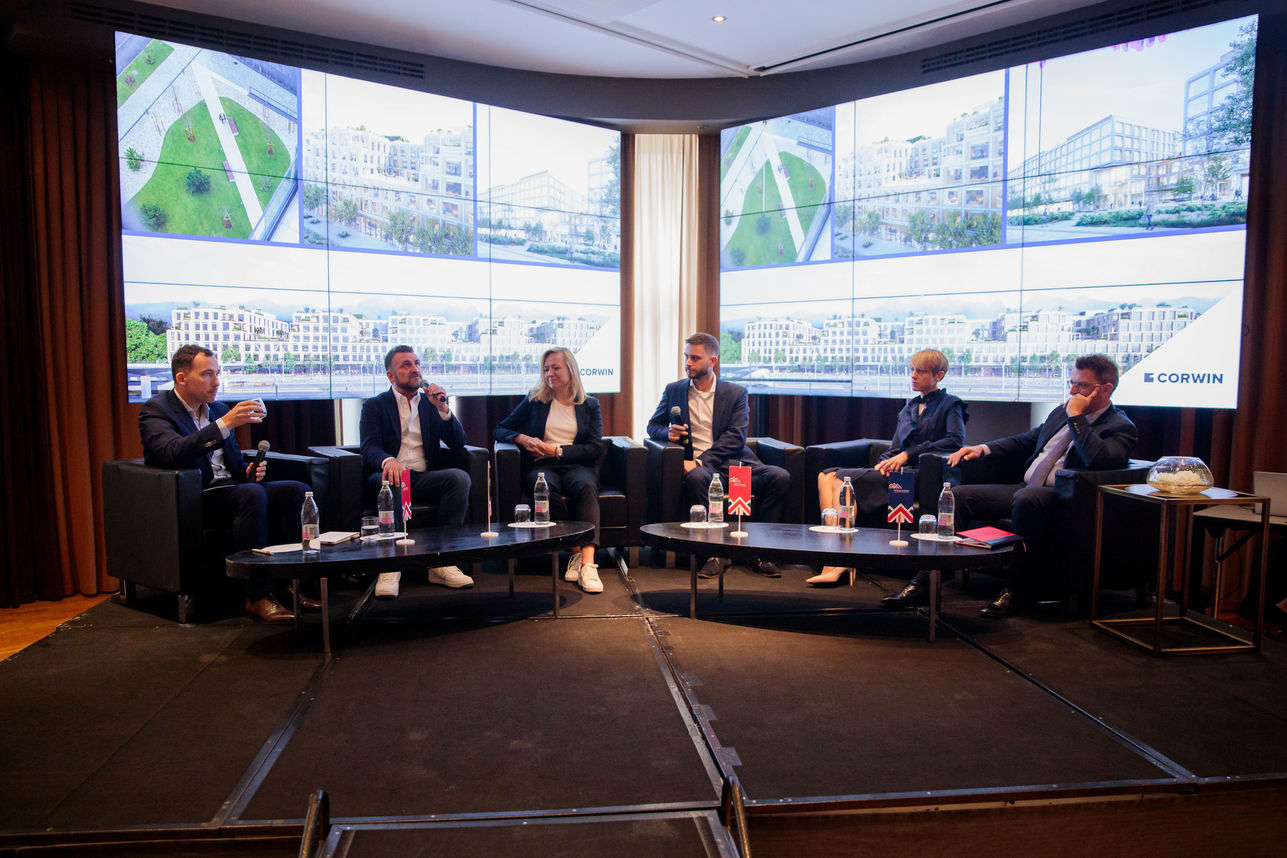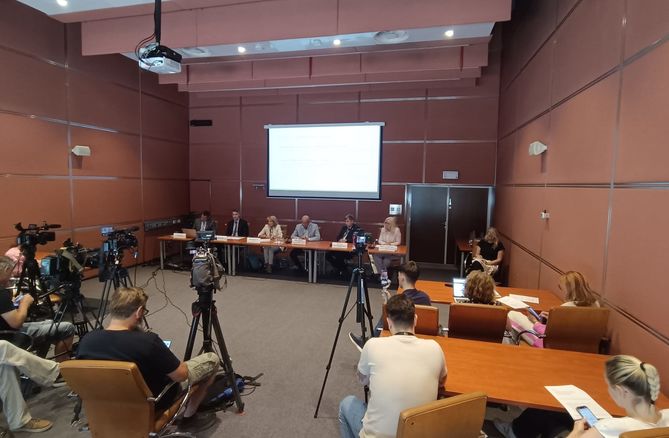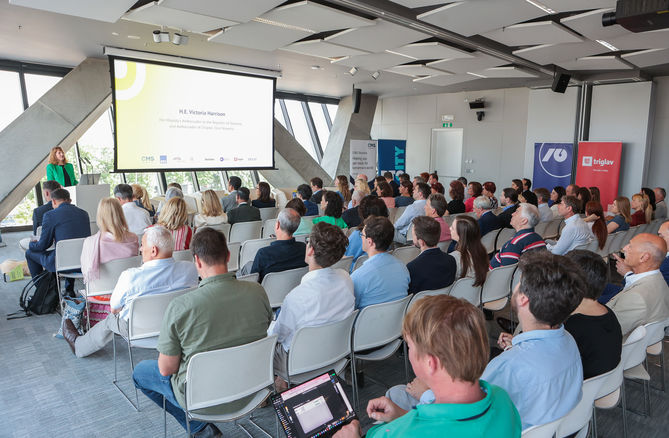Conference on the Future of Sustainable Real Estate Development and Employer Branding in Slovenia

Ljubljana, 19 September 2024 – The latest Tea with Reason Conference focused on sustainable urban development and innovative human resource practices. The discussion on the revitalization of brownfields in Slovenia into sustainable, vibrant urban spaces showed that such efforts aim to breathe new life into degraded industrial areas while integrating green technologies and community-focused solutions. On the HR front, the discussion outlined ways to improve employee wellbeing through strategic employer branding, from innovative workspace design, cultural change, emotional intelligence to open and transparent communication.
The conference began with a discussion on the revitalization of brownfields for sustainable real estate development. Michal Maco, Country Manager of Corwin Slovenia, stressed the potential of transforming degraded and underutilized urban areas into vibrant districts, "Brownfields, often found in prime city locations, are what we at Corwin refer to as ‘black holes.’ In Ljubljana, we’ve seen positive progress through dialogue with the city. We feel that there is a common understanding of the problem." At the same time, working closely with local communities has proven crucial in achieving not only the revitalisation of the physical space, but also ensuring good integration with the neighbouring environment.
Ljubljana’s commitment to such projects, including Zupančičeva jama and Brdo, was underlined by Katarina Konda, Head of Spatial Planning at the Municipality of Ljubljana. Konda expressed the municipality’s efforts to revitalize urban areas in Ljubljana and its support for Corwin’s ongoing projects in areas like Vilharia and Kolinska, "What’s even more beneficial here is having a single owner, as divided ownership often creates challenges for us. When there are multiple owners with different visions, it significantly delays the projects."
A key matter that emerged during the panel was the complexity of financing brownfields. Imre Balogh, CEO of Hranilnica Lon, explained, “In smaller markets like Slovenia, we rely more on bank loans than capital markets.” Balogh added that brownfields present unique risks in terms of construction, pollution, and permits, so it is crucial that the associated costs are also reduced with the help of different mechanisms such as European funds.
The renowned British architect Tim Gledstone, Partner at Squire & Partners, who has many years of experience also with projects in Slovenia, such as Kozolci Kranj, an urban residential-commercial neighbourhood, brought an international perspective to the discussion. Gledstone shared his insights on brownfield revitalization in London, “In our projects in locations such as Canary Wharf, understanding local communities' needs has been fundamental. Successful revitalization at the same time respects the heritage of the area while encouraging new growth.”
Gledstone further stressed that buildings should interact with and adapt to their environmental context. He also touched on the changing nature of workspaces, “The pandemic era accelerated a rethinking of office spaces,” he observed. “Companies now prioritize creating offices that celebrate their employees, transforming them into valuable company assets.” To illustrate this, Gledstone pointed to the practice’s revitalization of a dilapidated Edwardian department store in Brixton, now known as The Department Store.
As one of the real estate investors in Slovenia, Maja Ostanek Selak, CEO of ALFI Funds explained, "Brownfields have been overlooked by traditional investment funds like ours.” Nevertheless, she added that they see Vilharia as one of the perfect projects that would be suitable for any of the funds, especially because of the long-term lease agreements.
The second panel shifted its focus to how companies can attract and retain talent by rethinking work environments. Petra Zakrajšek, CEO of GAO architects, stressed the importance of architects in creating workspaces that foster employee well-being: “You have to think about how your employees will feel in the workspace. It’s all about understanding your clients’ needs and translating that into workspaces that feel like home." Building on this idea, Ivana Nedižavec Korada, Deputy Director of the Center of Excellence in Finance shared their approach, "We designed our offices to be agile, with no fixed desks, allowing employees to choose their workspace based on the task at hand. This flexible approach promotes creativity and accommodates the needs of different generations." Blaž Ferenc, Senior HR, Corporate Communication & Sustainability Director at A1 Slovenia & A1 Croatia, added how moving from closed offices to open-plan spaces 10 years ago contributed to reduced sick leave and employee satisfaction.
Reflecting on how workspaces have evolved post-pandemic, Katarina Primožič Ramoveš, People & Culture Director at NIL part of Conscia, noted, “We wanted to understand how we can bring people back to the office,” adding that they have been following a three-spear model, focusing on building company’s culture, supporting employees with technological tools, and designing workspace that boosts creativity. From a psychological perspective, Asst. Prof. Dr. Katarina Babnik from the Faculty of Arts, University of Ljubljana explained the benefits behind workspace design, “I find that nature elements like daylight tend to improve well-being and creativity. But if you add social elements such as organisational and leadership support or communication, then these factors become more important than elements of internal design.”
The final panel explored how HR strategies can contribute to empowerment and engagement of employees. Mateja Geržina, Executive Director for HR at Zavarovalnica Triglav stressed the importance of taking a systematic approach to cultural change, “It's not enough to simply announce change; a structured and thoughtful process is needed,” and outlined how the company approached its transformation. While they have seen positive results, she reminded the audience that this kind of cultural shift is an ongoing process.
The discussion also highlighted how communication breakdowns between leaders and employees can lead to deeper issues within a company. Drawing from her experience working with a Dutch client, Alja Berk, Alja Berk Coaching and member of the Association VTIS, explained how even with competitive salaries, new hires were leaving because of a glitch in communication between the leaders and employees, leading to distrust.
Another critical aspect raised was the need to give employees autonomy in their roles. Urška Stanovnik, Head of HR at Better, explained that empowering employees to work flexibly, and even allowing them to make and learn from their mistakes on their own, boosts motivation. She also explained that feedback, both top-down and bottom-up, is crucial in shaping a healthy company culture. Adding on the topic of feedback, Urška Kajtner, Head of Operations at MESI, noted that while their regular employee feedback collection has produced positive results, it has showed that establishing clear goals and providing ongoing development opportunities are more impactful than the physical work environment.
Finally, the importance of emotional intelligence was brought up by Mojca Balanč, Leadership Development Project Director at BOC Institute, who noted that empathy, social skills, and emotional control are vital to successful leadership. Changing automatic behaviours and deep-seated beliefs within organizations requires vulnerability and self-awareness, which are often the most difficult, yet necessary, qualities for leaders to develop.
The panels were moderated by Denis Mancevič, Co-Founder & CEO of New Century Corporate Communications, Janez Rakušček, Executive Creative Director at Luna TBWA, and Simona Špilak, Managing Director of BOC Institute.
A special thank you goes to the Main Partner of the Conference – CORWIN Slovenia.
Photos from the event are available here.



